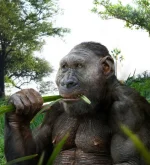- Joined
- Mar 29, 2013
- Messages
- 41,543
- Reaction score
- 8,934
- Gender
- Female
- Political Leaning
- Undisclosed
Contrary to what some keep insisting, that there is no evidence.............................. there are actually many evidences for GOD.
And all these evidences corroborate with one another - strengthening what is already partly established - to form a powerful presentation of an undeniable evidence for God.
Let's all be reminded too, that science has not ruled out GOD.
In fact, science acknowledges RELIGIOUS EXPERIENCE.
The National Academy of Sciences also says
Science is not the only way of acquiring knowledge about ourselves and the world around us. Humans gain understanding in many other ways, such as through literature, the arts, philosophical reflection, and religious experience.
Scientific knowledge may enrich aesthetic and moral perceptions, but these subjects extend beyond science's realm, which is to obtain a better understanding of the natural world.
Scientists, like many others, are touched with awe at the order and complexity of nature. Indeed, many scientists are deeply religious. But science and religion occupy two separate realms of human experience.
Demanding that they be combined detracts from the glory of each.
Many religious persons, including many scientists, hold that God created the universe and the various processes driving physical and biological evolution and that these processes then resulted in the creation of galaxies,
our solar system, and life on Earth. This belief, which sometimes is termed 'theistic evolution,' is not in disagreement with scientific explanations of evolution.
Indeed, it reflects the remarkable and inspiring character of the physical universe revealed by cosmology, paleontology, molecular biology, and many other scientific disciplines.
 map.gsfc.nasa.gov
map.gsfc.nasa.gov
You can't compartmentalize each given evidence, and do them separately without acknowledging the others.
Logic, doesn't work that way.
What are all these evidences I'm talking about?
There are so many - and some are so intricately connected that they overlap - it's hard to know where to start!
Here are some that I can think of right now:
THE BIBLE (information only the CREATOR would know - written descriptions of creation that were later reaffirmed by modern science)
COMPLEXITY and ORDER of the cosmos and biology - which of course, points to DESIGN
FINE-TUNING (universe, earth and earth's life) - which of course, points to DESIGN.
ORIGIN OF THE UNIVERSE
ORIGIN OF LIFE
RARE EARTH - earth being unique.
HUMAN EXCEPTIONALISM - distinct apart from others in possessing the capacity for symbolic recognition, for complex language, art, and music, for technological advancement, and for spiritual and philosophical engagement.
LAWS OF MATHEMATICS
HUMAN CONSCIOUSNESS - no physical presence yet mysteriously guides the physical actions of our bodies.
PERSONAL EXPERIENCES OF GOD
LOGIC and PHILOSOPHICAL
DAY-AGE THEORY - the fact that many scientists can see the creation narrative as compatible with scientific findings.
And all these evidences corroborate with one another - strengthening what is already partly established - to form a powerful presentation of an undeniable evidence for God.
Let's all be reminded too, that science has not ruled out GOD.
In fact, science acknowledges RELIGIOUS EXPERIENCE.
The National Academy of Sciences also says
Science is not the only way of acquiring knowledge about ourselves and the world around us. Humans gain understanding in many other ways, such as through literature, the arts, philosophical reflection, and religious experience.
Scientific knowledge may enrich aesthetic and moral perceptions, but these subjects extend beyond science's realm, which is to obtain a better understanding of the natural world.
Scientists, like many others, are touched with awe at the order and complexity of nature. Indeed, many scientists are deeply religious. But science and religion occupy two separate realms of human experience.
Demanding that they be combined detracts from the glory of each.
Many religious persons, including many scientists, hold that God created the universe and the various processes driving physical and biological evolution and that these processes then resulted in the creation of galaxies,
our solar system, and life on Earth. This belief, which sometimes is termed 'theistic evolution,' is not in disagreement with scientific explanations of evolution.
Indeed, it reflects the remarkable and inspiring character of the physical universe revealed by cosmology, paleontology, molecular biology, and many other scientific disciplines.
WMAP Site FAQs
Public access site for The Wilkinson Microwave Anisotropy Probe and associated information about cosmology.
You can't compartmentalize each given evidence, and do them separately without acknowledging the others.
Logic, doesn't work that way.
What are all these evidences I'm talking about?
There are so many - and some are so intricately connected that they overlap - it's hard to know where to start!
Here are some that I can think of right now:
THE BIBLE (information only the CREATOR would know - written descriptions of creation that were later reaffirmed by modern science)
COMPLEXITY and ORDER of the cosmos and biology - which of course, points to DESIGN
FINE-TUNING (universe, earth and earth's life) - which of course, points to DESIGN.
ORIGIN OF THE UNIVERSE
ORIGIN OF LIFE
RARE EARTH - earth being unique.
HUMAN EXCEPTIONALISM - distinct apart from others in possessing the capacity for symbolic recognition, for complex language, art, and music, for technological advancement, and for spiritual and philosophical engagement.
LAWS OF MATHEMATICS
HUMAN CONSCIOUSNESS - no physical presence yet mysteriously guides the physical actions of our bodies.
PERSONAL EXPERIENCES OF GOD
LOGIC and PHILOSOPHICAL
DAY-AGE THEORY - the fact that many scientists can see the creation narrative as compatible with scientific findings.
Last edited:





